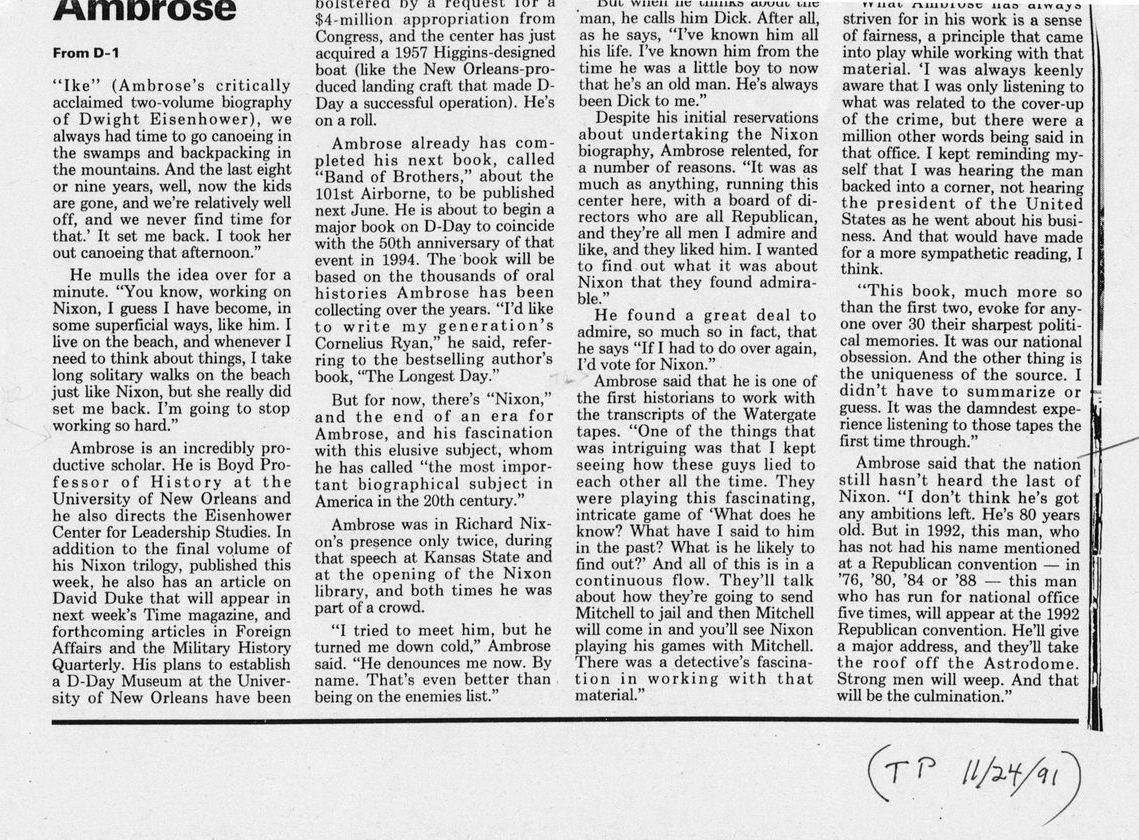This text was obtained via automated optical character recognition.
It has not been edited and may therefore contain several errors.
Mrrmrose From D-1 ?Ike? (Ambrose?s critically acclaimed two-volume biography of Dwight Eisenhower), we always had time to go canoeing in the swamps and backpacking in the mountains. And the last eight or nine years, well, now the kids are gone, and we?re relatively well off, and we never find time for that.? It set me back. I took her out canoeing that afternoon.? He mulls the idea over for a minute. ?You know, working on Nixon, I guess I have become, in some superficial ways, like him. I live on the beach, and whenever I need to think about things, I take long solitary walks on the beach just like Nixon, but she really did set me back. I?m going to stop working so hard.? Ambrose is an incredibly productive scholar. He is Boyd Pro-fessor of History at the University of New Orleans and he also directs the Eisenhower Center for Leadership Studies. In addition to the final volume of his Nixon trilogy, published this week, he also has an article on David Duke that will appear in next week?s Time magazine, and forthcoming articles in Foreign Affairs and the Military History Quarterly. His plans to establish a D-Day Museum at the University of New Orleans have been ooisterea ?y a request lor a $4-million appropriation from Congress, and the center has just acquired a 1957 Higgins-designed boat (like the New Orleans-produced landing craft that made D-Day a successful operation). He?s on a roll. Ambrose already has completed his next book, called ?Band of Brothers,? about the 101st Airborne, to be published next June. He is about to begin a major book on D-Day to coincide with the 50th anniversary of that event in 1994. The book will be based on the thousands of oral histories Ambrose has been collecting over the years. ?I?d like to write my generation?s Cornelius Ryan,? he said, referring to the bestselling author?s book, ?The Longest Day.? But for now, there?s ?Nixon,? and the end of an era for Ambrose, and his fascination with this elusive subject, whom he has called ?the most important biographical subject in America in the 20th century.? Ambrose was in Richard Nixon?s presence only twice, during that speech at Kansas State and at the opening of the Nixon library, and both times he was part of a crowd. ?I tried to meet him, but he turned me down cold,? Ambrose said. ?He denounces me now. By name. That?s even better than being on the enemies list.? I3UU wiitii lie i/iniiitd auuui me man, he calls him Dick. After all, as he says, ?I?ve known him all his life. I?ve known him from the time he was a little boy to now that he?s an old man. He?s always been Dick to me.? Despite his initial reservations about undertaking the Nixon biography, Ambrose relented, for a number of reasons. ?It was as much as anything, running this center here, with a board of directors who are all Republican, and they?re all men I admire and like, and they liked him. I wanted to find out what it was about Nixon that they found admirable.? He found a great deal to admire, so much so in fact, that he says ?If I had to do over again, I?d vote for Nixon.? Ambrose said that he is one of the first historians to work with the transcripts of the Watergate tapes. ?One of the things that was intriguing was that I kept seeing how these guys lied to each other all the time. They were playing this fascinating, intricate game of ?What does he know? What have I said to him in the past? What is he likely to find out?? And all of this is in a continuous flow. They?ll talk about how they?re going to send Mitchell to jail and then Mitchell will come in and you?ll see Nixon playing his games with Mitchell. There was a detective?s fascination in working with that material.? " nat muuiuac nao aiwajo striven for in his work is a sense of fairness, a principle that came into play while working with that material. ?I was always keenly aware that I was only listening to what was related to the cover-up of the crime, but there were a million other words being said in that office. I kept reminding myself that I was hearing the man backed into a corner, not hearing the president of the United States as he went about his business. And that would have made for a more sympathetic reading, I think. ?This book, much more so than the first two, evoke for anyone over 30 their sharpest political memories. It was our national obsession. And the other thing is the uniqueness of the source. I didn?t have to summarize or guess. It was the damndest expe- (j rience listening to those tapes the I first time through.? Ambrose said that the nation 1 still hasn?t heard the last of Nixon. ?I don?t think he?s got J any ambitions left. He?s 80 years il old. But in 1992, this man, who I has not had his name mentioned at a Republican convention ? in ?76, ?80, ?84 or ?88 ? this man who has run for national office five times, will appear at the 1992 Republican convention. He?ll give a major address, and they?ll take the roof off the Astrodome. Strong men will weep. And that will be the culmination.? Z a EHI <3 -a H 1 & ? g ?i?S ? O, is '9 Mi Q> * Si ai ?- -Q s

Ambrose, Stephen End-of-an-era-for-Nixon-biographer-part2